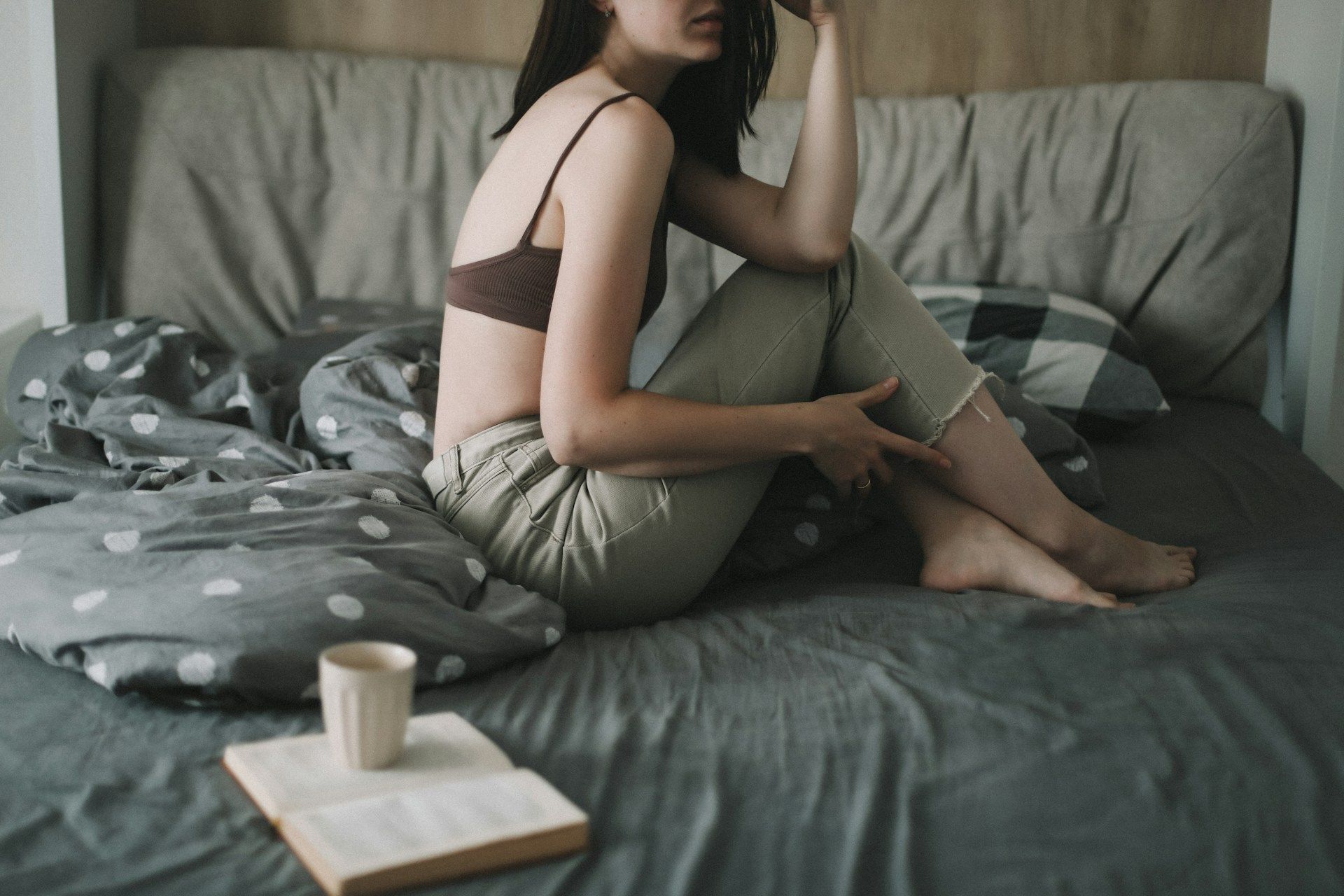How to Help Menopause Hip Pain at Night

Facing menopause body aches at night? You’re not alone.
It’s estimated that up to 63% of women experience disrupted sleep due to the menopause. While some part of this percentage is caused by pesky night sweats, hip pain and body aches are other significant complaints.
Good sleep can be hard enough, but extra discomfort can prevent you from falling into deep, restorative rest.
Let’s explore the causes and how to help menopause hip pain at night.
How To Stop Menopause Hip Pain At Night
Stopping menopause hip pain at night isn’t just about your hips.
It’s often affected by your overall sleep environment. This includes your sleeping position and what you’re sleeping on (e.g., your mattress and pillows).
You need to relax your body by optimising these elements. Luckily, this only takes minor changes.
Choosing the Right Sleeping Position
One of the simplest ways to reduce hip and aching joints at night from menopause is to adjust your sleep position.
Side sleeping is the best route, relieving pressure on the hips and supporting better spinal alignment. Front and back sleeping aren’t as healthy, and can place extra strain on the spine (Cary, Jacques and Briffa, 2021).
But there’s a catch: You have to get the position right.
Use a proper side sleeping posture and even consider a knee pillow for hip pain. The Groove X Pillow can help keep your hips, pelvis, and spine aligned, reducing the strain on your joints while enhancing your comfort.
Shop Groove X Pillow
Adding Optimal Pillows
Not all pillows are designed with ergonomics in mind. Choosing memory foam or specialised pillows ensures comfort tailored to the human body.
Supportive pillows help reduce pressure points, prevent your hips from twisting awkwardly, and make it easier to fall into a comfortable, pain-free sleep, even when experiencing menopause symptoms.
For example, the Groove Adjustable Pillow lets you customise the height and firmness, giving your neck and shoulders the support they need without throwing off the rest of your body’s alignment.
Curious? See all of the Groove pillows now.
Shop NowSelecting a Supportive Mattress
Think of yourself as Goldilocks. A too-soft or too-firm mattress can worsen hip pain.
Opt for a medium-firm memory foam or hybrid mattress that contours to your body. This lessens pressure on hips and lower back while providing balanced support.
While at it, try to keep a cool, clutter-free bedroom with blackout curtains and breathable bedding, as this also promotes better, more restful sleep.

Why Does Menopause Cause Hip and Joint Pain at Night?
Estrogen is the main culprit behind menopause body aches at night.
This hormone doesn’t just regulate your cycle. It also affects joint health and inflammation. You may experience more pain and discomfort as it decreases, particularly at night.
Similarly, skeletal muscle weakness is common during menopause, and it’s also associated with decreasing estrogen levels as the ovaries slow down (Collins, Laakkonen, and Lowe, 2019).
In numbers, studies suggest that 70% of women will experience these musculoskeletal aches, and they could disable a further 25% (Wright et al., 2024).
Lower estrogen levels also affect the connective tissues that cushion your joints. That can lead to less flexibility and more stiffness. It’s probably why you’ve felt like you’re 90 years old while getting out of bed in the mornings.
Extra Help for Sleeping with Menopausal Aches
The menopause can feel very doom and gloom, but you can manage symptoms at home with a range of lifestyle changes. These include:
- Heat or cold therapy — A warm bath or heated pad in the evenings can help your muscles relax. Similarly, you can use a cold compress to lessen inflammation and dull pain signals.
- Gentle stretching or yoga — 10 minutes of non-invasive stretching can help loosen up stiff hips and improve pain throughout the night. If any yoga fans are reading, focus on cat-cow stretches and hip openers.
- Massages — Gentle massages can help to release tension, so adding this to your nighttime routine can be both relaxing and beneficial for your hips. Consider using a foam roller to take this to the next level.
It’s important to note that menopause body ache symptoms can overlap with conditions like fibromyalgia (increased pain sensitivity and disrupted sleep).
If your aches are widespread or paired with fatigue and brain fog, you might want to discuss them with your GP.
When to Consult a Healthcare Professional
It’s important to listen to your body.
Menopausal hip and body pain is often easily treated at home. However, you should monitor your symptoms.
If your body pain is persistent, severe, or interfering with daily activities, it’s time to visit your healthcare provider. Menopause can cause or worsen conditions like arthritis or osteoporosis, which need proper diagnosis and treatment.
If you’re experiencing severe pain, call 111 for immediate advice.
Last Thoughts
Sleep should be a natural end to the day, not a painful encounter. Hopefully, these tips will help you sail into dreamland without any hormone-led interruptions.
Groove is here to help you find comfort and relief with specially designed support pillows. Check out the Groove X Pillow now to see how it can improve your rest.
Shop Groove X PillowOr return to the Sleep Resources Hub for more advice and science-backed blogs.
References
- Cary, D., Jacques, A. and Briffa, K. (2021). Examining relationships between sleep posture, waking spinal symptoms and quality of sleep: A cross sectional study. PLOS ONE, 16(11), p.e0260582. doi:https://doi.org/10.1371/journal.pone.0260582.
- Collins, B.C., Laakkonen, E.K. and Lowe, D.A. (2019). Aging of the musculoskeletal system: How the loss of estrogen impacts muscle strength. Bone, [online] 123, pp.137–144. doi:https://doi.org/10.1016/j.bone.2019.03.033.
- Wright, V.J., Schwartzman, J.D., Itinoche, R. and Wittstein, J. (2024). The musculoskeletal syndrome of menopause. Climacteric: The Journal of the International Menopause Society, [online] 27(5), pp.1–7. doi:https://doi.org/10.1080/13697137.2024.2380363.

